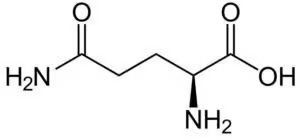Table of Contents
Key Takeaways
- L-glutamine is a conditionally essential amino acid, vital for brain function, as it serves as a precursor to neurotransmitters glutamate and GABA.
- Glutamine plays multiple essential roles in the body, including protein synthesis, muscle growth, immune system function, neurotransmitter synthesis, and glucose metabolism.
- L-glutamine supplementation can positively impact human growth hormone levels, muscle recovery, and intestinal permeability in inflammatory bowel disease.
- Maintaining a balance between glutamine and glutamate/GABA is crucial for optimal brain health, as disruptions can lead to various brain conditions and neurodegenerative diseases.
- L-glutamine supplementation can improve concentration, focus, memory, mood, and overall brain performance.
L-glutamine is a conditionally essential amino acid and main precursor for the production of the neurotransmitters glutamate and GABA (γ-aminobutyric acid) in your brain.
Glutamine is the most abundant amino acid in your body. And is involved in many of your bodily functions. Including much of the activity in your brain.[i] But L-glutamate is the most abundant amino acid in your brain. And the balance of these two is critical for optimal brain function.
The function of the glutamine/glutamate cycle is involved in protein synthesis, precursors for muscle growth, regulation of the acid-base balance in your kidneys, provides oxidative fuel for your intestine and immune system cells, provides nitrogen transport between organs, acts as precursors to neurotransmitter synthesis, nucleotide and nucleic acid synthesis for glutathione production, and glucose metabolism.[ii]
L-glutamine supplementation is mostly talked about in athletic and body building circles for its effect on human growth hormone and muscle recovery after a workout, or for its effects on inflammatory bowel disease (IBD) for its reduction in intestinal permeability. But L-glutamine is largely ignored by the nootropics community.
L-glutamine is so critically important to the optimized brain that by reading this post, you’ll understand why it may be an important addition to your nootropic stack.
L-glutamine helps:
- Neurotransmitters. L-glutamine is a precursor to the excitatory amino acid and neurotransmitter glutamate and aspartate. And the inhibitory amino acid and neurotransmitter GABA. Affecting alertness, concentration, focus, memory and mood.
- Brain Inflammation. L-glutamine helps boost your body’s immune response. Increasing antibodies to fight against viruses and bad bacteria. L-glutamine helps tame inflammatory cytokines. And L-glutamine detoxes the brain from excess ammonia and converts it into other amino acids, sugars and urea.
- Stress. L-glutamine supplies energy to immune and intestinal cells. Not enough glutamine and these cells become sluggish and can’t function properly. Supplementary L-glutamine is especially important during times of stress, tension and physical strain.
What is L-Glutamine?
L-glutamine is an essential amino acid and precursor for the production of glutamate. Glutamate is the most abundant neurotransmitter in your brain.

As an ‘excitatory’ neurotransmitter, glutamate is released from pre-synaptic cells and then binds to post-synaptic cells inducing activation. Too much glutamate and neurons become overactive causing a toxic environment that is harmful to neurons. And to cognition.
To keep this process in check, glutamate is also a precursor to the ‘inhibitory’ neurotransmitter GABA. GABA works by preventing neural signaling in over-excited neurons caused by glutamate that could result in anxiety and depression.[iii]
The balance of glutamine and glutamate has been identified in an array of brain conditions (i.e. mental illness, tumor, neurodegeneration) as well as in normal brain function.[iv]
The precursor relationship between glutamine and glutamate/GABA is often referred to in scientific and research circles as the Gln/Gly(GABA) cycle.[v] Glutamine is naturally synthesized from glutamate and ammonia in brain cells called astrocytes in a reaction catalyzed by glutamine synthetase (GS).
Newly synthesized glutamine is transferred to neurons and hydrolyzed by phosphate-activated glutaminase (PAG) to then produce glutamate. A portion of which may be decarboxylated to GABA or transaminated to Aspartate.
Glutamate, the excitatory neurotransmitter and GABA, the calming neurotransmitter rely on this cycle to maintain homeostasis within your brain. Glutamine also modulates the synthesis of Nitric Oxide by controlling the supply of its precursor arginine.
When this cycle gets out of whack, things start to break down. The results can be particularly nasty. And result in conditions like epilepsy, or hepatic encephalopathy which effects behavior, mood, speech, sleep and the way you move.
L-glutamine becomes a “conditionally” essential amino acid when your body can’t produce enough on its own. And you need to replenish L-glutamine levels either through supplementation or food.[vi]
L-glutamine can be found in foods such as beef, pork, fish, eggs, milk and dairy products, wheat, cabbage, beets, beans, spinach and parsley.
How does L-Glutamine work in the Brain?
L-glutamine helps brain health and function in several ways. But two in particular stand out.
- L-glutamine is critical for an optimized brain. L-glutamine is a precursor to the neurotransmitter glutamate in your brain. The balance of glutamine and glutamate is crucial to an optimized and healthy brain. The normal cycling of glutamine and glutamate takes a huge amount of energy in the brain. Research has estimated that the Gln/Gly (GABA) cycle accounts for more than 80% of cerebral glucose consumption.[vii] So when you’re using nootropics like Resveratrol or PQQ to boost mental energy, much of that energy is going towards maintaining this Gln/Gly (GABA) cycle.
A disruption of this cycle results in all kinds of problems including Reye’s Syndrome, epilepsy, bipolar disorder, schizophrenia, anxiety, depression, and alcohol addiction.[viii]One Korean study measured Glutamate and Glutamine concentrations in the prefrontal cortex of mice infused with an astrocyte toxin. And they used other inhibitors to disrupt the Glu/Gln cycle. Glutamate and glutamine levels decreased on the 5th day in the mice. The animals experienced immobility and a decreased preference for sucrose (sugar). A sure indication in mice of depression.Direct infusion of L-glutamine completely reversed all the impairments that were originally induced in the animals. And the researchers concluded that neuronal deficiency of L-glutamine causes depression.[ix]
- L-glutamine also helps prevent brain aging. Researchers have long been on the hunt to determine what causes the human brain to age. Recently, mitochondrial dysfunction has been implicated in the loss of brain function in neurodegenerative diseases and aging.[x] Leading to an abnormal increase in the excitatory neurotransmitter glutamate.
A study at the New York University School of Medicine used 28 patients with mild traumatic brain injury and 22 matched controls. Gray and white matter in their brains was measured using MRI’s. The study found that one year after traumatic brain injury there was significant global brain atrophy. Much larger than in the control subjects. The team noted the amount of brain damage from just one concussion. And that this type of injury was not exclusive to a severe blow to the head. Even mild injury could cause brain damage.[xi] Most of the damage was associated with a disrupted Glu/Gln cycle and an abnormal increase in glutamate levels.[xii]
How things go bad
Low levels of L-glutamine are associated with a variety of health problems.
↓ Cellular energy drops and immune system weakens
↓ Short- and long-term memory declines
↓ Mood and anxiety disorders, insomnia, and lack of concentration
↑ Muscle spasms, hypertension, convulsion, Tourette’s Syndrome and epilepsy
↑ Ammonia levels rise in brain cells[xiii]
↓ Poor digestion, bloating, flatulence, and constipation
When your neurotransmitters, including L-glutamine and glutamate are in balance, you feel motivated, productive and energetic. And you feel calm and relaxed during downtime.
When L-glutamine levels are low you feel filled with dread, you’re constantly worried, you have racing thoughts, and you’re frequently late and disorganized.
Many people in this L-glutamine -slump resort to high carbohydrate foods, and drugs or alcohol to relax.
L-Glutamine benefits
The amino acid L-glutamine is the precursor to L-glutamate production in your body. L-glutamate gets converted to GABA.
 Glutamate is your body’s most abundant excitatory neurotransmitter. Which is responsible for attention span, brain energy, learning ability, memory, and staying awake.
Glutamate is your body’s most abundant excitatory neurotransmitter. Which is responsible for attention span, brain energy, learning ability, memory, and staying awake.
An enzyme called glutamate decarboxylase converts glutamate to GABA. It does it with the help of the active form of Vitamin B6 (Pyridoxal-5-Phosphate (P5P)).
The amino acid taurine helps increase the communication and productivity of this enzyme. And zinc helps the release of GABA from its receptors.
When this Gln/Gly (GABA) cycle works efficiently, you feel relaxed with no stress or feelings of anxiety. Detoxification of your liver results in a more restful night’s sleep. Focus, concentration, memory and mood all improve.
How does L-Glutamine feel?
During times of chronic, long-term stress caused by physical exertion or illness, glutamine levels in your body can drop by 50% or more.[xiv]
Supplementing with L-glutamine can improve your quality of life, increase energy levels, reduce muscle aches, improve digestion and gut health, improve quality of sleep, and reduce pain and fatigue.
When you balance L-glutamine levels in your brain, you feel relaxed and calm. Cravings for sugar and alcohol will decline.
L-glutamine will help in recovery from workouts and improve performance. You may find it easier to lose weight.
Many neurohackers use L-glutamine to help heal Leaky Gut Syndrome and reduce the symptoms of Crohn’s and Celiac Disease.
As a nootropic, L-glutamine can help improve alertness, concentration, focus, memory and mood.
L-Glutamine Clinical Research
L-glutamine was identified as a neurotransmitter several decades ago. And there has been a lot of research on L-glutamine published since. But most of it is focused on strength training and maintaining muscle mass in athletes. And for people healing from surgery or recovering from illness.
But L-glutamine can be a powerful nootropic as well. Here are a couple of studies looking at L-glutamine for brain health.
L-glutamine Increases Human Growth Hormone
Bodybuilders and athletes use supplementary L-glutamine to help repair and build muscle. And there are several studies supporting the notion that L-glutamine increases Human Growth Hormone.
In one study, researchers worked with 9 healthy subjects and gave them 2 grams of L-glutamine in a cola drink. Blood samples were taken before drinking the cola-spiked drink, then again at 30 mins., 60 and 90 mins.
The researchers found that both blood L-glutamine and human growth hormone levels were significantly higher than before taking L-glutamine. The team concluded that “a surprisingly small oral L-glutamine load was capable of elevating growth hormone”.[xv]
Human growth hormone and Brain-Derived Neurotrophic Factor (BDNF) are intricately linked. BDNF is involved in Long-Term Potentiation and the encoding of long-term memories.
L-glutamine Improves Cerebral Performance
Lack of concentration and poor memory can be improved by supplementing with L-glutamine with Vitamin B3 (niacin). Some of the glutamine in your blood is transformed into glutamic acid in your brain.
Glutamic acid functions first as fuel, but it also gets rid of excess ammonia by binding to this cellular toxin and converting it into glutamine.
A study in the Netherlands conducted a randomized, double-blind, placebo controlled trial with 42 healthy men and woman aged 40 – 76 years. Subjects received a 5-gram stack containing glycine, L-glutamine and niacin twice daily for 3 weeks.
The L-glutamine stack increased Human Growth Hormone a whopping 70% compared to placebo. But surprisingly it wasn’t the growth hormone that improved memory and vigor. It was insulin-like growth factor-I that improved memory and vigor. Attributed to the L-Glutamine stack the subjects took for 3 weeks.[xvi]
L-Glutamine Nootropic Recommended Dosage 
Most people don’t get enough L-glutamine from food alone. And why adding L-glutamine to your nootropic stack can boost your immune system, improve your ability to fight infection and diseases, and boost cognition.
The recommended daily dosage of L-glutamine is 2 to 5 grams per day.
Serious power athletes often dose up to 10 grams of L-glutamine per day.
L-Glutamine Side Effects
L-glutamine is considered very safe when taken in normal recommended doses.
Rarely do people report side effects like nausea, vomiting, flatulence, abdominal pain, constipation, dry mouth, hemorrhoids, dizziness, depression, skin rashes, insomnia and increased sweating. Remember, the balance between L-glutamine and glutamate (Gln/Gly (GABA) cycle) is critical for optimal health.
If you are dealing with any form of cancer and are either being treated for it or are in remission, you should consult with your doctor before you start supplementing with L-glutamine.
If you are dealing with cirrhosis of the liver, you should avoid L-glutamine. If you have severe liver disease that includes difficulty thinking or confusion (hepatic encephalopathy), don’t use L-glutamine.
If you are allergic or sensitive to Monosodium Glutamate (MSG), you may be sensitive to L-glutamine because your body converts it to glutamate.
And if you have a severe mental disorder including mania or frequently have seizures you may want to avoid L-glutamine.
Types of L-Glutamine to Buy
L-glutamine as a supplement is available in tablet, capsule and powder.
The most commonly available form of L-glutamine as a nootropic supplement is called “free form” glutamine.
Trans-Alanyl or Alanyl-L-glutamine is an amino acid attached to another amino acid which aids in digestion of this supplement.
If you are using it to boost athletic performance and speed recovery, both forms of L-glutamine are best taken right before or after a workout. Using it with small meals before or after your workout session can help support your metabolism and weight loss goals. And will assist in muscle building, recovery and maintenance.
Nootropics Expert Recommendation
L-Glutamine 2 – 5 grams per day.
 I recommend using L-glutamine as a nootropic supplement if you’re dealing with anxiety or stress. And to calm or keep in check some of the stimulatory effects of some nootropics.
I recommend using L-glutamine as a nootropic supplement if you’re dealing with anxiety or stress. And to calm or keep in check some of the stimulatory effects of some nootropics.
Your body does make L-glutamine on its own from glutamate in your brain. But most people do not maintain an adequate supply of L-glutamine in their system.
And if you’re dealing with illness, recovery from surgery, strenuous physical activity like working out, Leaky Gut Syndrome, Crohn’s or Celiac Disease, and need some help in recovery, L-glutamine can help.
L-glutamine also helps to curb the desire for sugar, carbs and alcohol.
We suggest trying a L-glutamine supplement first at a dose of 500 mg. And see how you react. You can safely dose up to 20 grams of L-glutamine per day. But most neurohackers find much lower doses effective for boosting cognition, mood and memory.








Join The Discussion - 148 comments
Jozef
January 25, 2021
Hi David, it should not be a dangerous combination between Escitalopram and L-glutamine…Am I right? Thank you
David Tomen
January 25, 2021
Jozef, I am not aware of any contraindications between the two. So in general it should not be a problem. But each of us responds differently to these drugs, supplements and combinations.
Jozef
January 25, 2021
Thank you David.
candace
January 20, 2021
Curious about interactions or recommended cycling between GABA and L-Glutamine. I take other nootropics but my question is just in regards to these 2.
I take 500mg GABA around bedtime or if I notice fixated thinking/ obsessive thinking/ extreme anxiety. I am not opposed to taking this only some times.
I have a 10 year history with extreme digestion issues (ive been told it sounds like a Vagus nerve compensation) and have had ulcers. I was recommended trying L-Glutamine to help with these digestive issues and assisting with my immune system.
My question I guess is what would be the potential downside to taking both. Should I adjust the doses to half each?
I am leaning towards alternating as to hit my mood/behaviour issues with GABA and then stomach issues + sleep benefits with L-Glutamine.
Thank you in advance.
David Tomen
January 21, 2021
Candace, that is great question but there is no ‘standard’ protocol for dosages with GABA and L-Glutamine. The thing is L-Glutamine goes on to produce L-Glutamate and GABA.
For now, the best thing to do is experiment. Try using both supplements with reduced dosages for each. And then try using L-Glutamine in the morning and GABA before bed.
Google the symptoms for “too much GABA” or “excess GABA” so you know what to watch out for.
And please let the community know what you’ve learned through experimenting with these two supplements.
Jozef
January 14, 2021
Hi David, Is there any difference between fermented and not fermented glutamine? Or are they all fermented? Thank you.
David Tomen
January 14, 2021
Jozef, they are not all the same. Fermented glutamine is extracted from fermented food like fermented beets. And is said to be easier to digest. Regular glutamine can come from regular foods like wheat or shellfish. And is harder to digest.
Jozef
January 15, 2021
So fermented glutamine is a better choice.
David Tomen
January 16, 2021
Josez, it’s easier on your digestive system. So likely a better choice for most people.
Dan
December 22, 2020
Hi David,
here is Dan again (posted a few questions on other Threads).
I am still working on my anxiety.
I was taking about 1g L-Glutamine at night and it feels like it made me a little bit tired/relaxed.
Would that mean Glutamine successfully got converted to Gaba (so i dont have any problems with conversion) ?
Could that mean i am probably deficient in Glutamine ?
I dont know if it fixes my insomnia, i just took it 2-3 times on different days. I can report back later.
David Tomen
December 23, 2020
Dan, if that was your experience then yes, it sounds like your system converts L-Glutamine to GABA as designed. From what I’ve seen it seems most people are deficient in L-Glutamine to a certain extent.
I highly doubt that just this one supplement will solve your insomnia problem. But it could be an integral part of it along with 3 or 4 other supplements. Until you find that sweet spot and get sound sleep.
Dan
December 24, 2020
Thanks David,
but yeah that would mean i can take Glutamine to fix my Gaba deficiency problems maybe, probably more efficient then with gaba.
I need to do further testing to find out if it fixes my high glutamate/low gaba problem.
salem
December 8, 2020
hi david
whats the best time to take glutamine ?
first in morning?
with meal or an empty stomach ?
thanks
David Tomen
December 8, 2020
Salem, it doesn’t matter when you take L-Glutamine unless you are doing larger doses. Then you could split the dose morning and afternoon.
Athletes take if an hour or so before a workout and some again after the workout. Typically with a small meal.
Jozef
December 6, 2020
Hi David, I want to ask that these four nootropics (L-tryptophan, L-tyrosine, L-glutamine and Alpha GPC) are enough to supplement all neurotransmitters? Thank you very much for your website and your work.
David Tomen
December 7, 2020
Josef, the only “major” neurotransmitter you are missing is oxytocin which can’t easily be raised using a precursor.
Jozef
December 7, 2020
Can low neurotransmitter levels be related to hair loss? Is it possible to reduce hair loss and what substances? thank you
David Tomen
December 7, 2020
Jozef, hair loss is most often associated with the hormone DHT. Not neurotransmitter imbalances.
Effective methods of maintaining and regaining hair include rosemary (https://nootropicsexpert.com/rosemary/) essential oil (diluted) and scalp massage.
Jozef
December 8, 2020
David, thank you very much for answer and my last question is, if L-tryptophan, L-tyrosine and L-glutamine can be taken together.
David Tomen
December 8, 2020
Josef, they can be taken together. But most use L-Tyrosine during the day. And L-Tryptophan before bed. The latter because it contributes to the synthesis of melatonin. And they will compete for the same enzyme for conversion so best taken separately. L-Glutamine can be taken any time.
Steve Cozzolino
November 6, 2020
Hi David,
Thank you very much for producing and maintaining your web site; your work has facilitated my investigation of solutions for CADASIL. In additional to finding brain enhancing supplements from your site, I am also investigating supplements that may help with my insomnia. I have had 3 small strokes over the last 5 years and I believe this has disrupted my sleep. I’m wondering if the strokes have elevated my excitatory glutamate levels making it harder for me to relax and fall asleep. In the article you infer that glutamine supplementation will bring the glutamine-glutamate/GABA cycle back into normal range meaning that if glutamate is too high, it will come back under control. You state “L-glutamine also helps prevent brain aging…Recently, mitochondrial dysfunction has been implicated in the loss of brain function in neurodegenerative diseases and aging.[x] Leading to an abnormal increase in the excitatory neurotransmitter glutamate.” I searched some of the articles that you reference but I did not see a clear statement that supplementation with glutamine will decrease or bring into control the excitatory glutamate level. Can you please point me to the article or share with me your rational? Thank you!
David Tomen
November 7, 2020
Steve, the Gln/Gly(GABA) cycle is well-known in the neuroscience research community. This study is one example of how it works: https://pubmed.ncbi.nlm.nih.gov/22018046/.
I make an attempt at describing how this works under the “Overview” section above.
Then the 2nd study under the first bullet in this section “How does L-glutamine work in the Brain?” describes “Direct infusion of L-glutamine completely reversed all the impairments that were originally induced in the animals.”
I guess the only way to find out if this works is to try L-Glutamine for awhile and see if it helps. I’d also like you to scroll down to the section “Vascular dementia, Cerebral Circulation and brain aging” in this article: https://nootropicsexpert.com/best-nootropics-for-the-aging-brain/ for some other ideas.
I seem to recall a couple of nootropics benefiting stroke victims AFTER a stroke but they don’t come to mind at the moment. One thing you may try is doing a search of Nootropics Expert using the search function above the top menu and search for “stroke”. It’s not a great option because you’ll still need to do some searching. But you will get all of the pages on this site that talks about nootropics that help stroke.
Ava
August 29, 2020
Hello David. Can you please share your thoughts on the interaction between glutamine and tryptophan/serotonin?
I take 1tsp glutamine for the irritable bowel which would otherwise occur during my runs (i.e. I need to find a bush asap). Glutamine helps immeasurably. However I have noticed a significant drop in my mood since taking glutamine. So much so that running does not help my depression, whereas before it was the central to my depression management.
I’ve seen casual mention of glutamine impacting tryptophan absorption. The inference being less is available for serotonin production/uptake/other.
It seems I’m having to choose between giving up my runs, or being depressed. So I welcome any thoughts you may have on the glutamine/tryptophan interaction.
Thank you.
Ava
David Tomen
August 31, 2020
Ava, I want you to scroll all the way back to the top of this review. And re-read the first paragraph. Then scroll down to this section called, “How does L-glutamine work in the Brain?” and read #1.
This has nothing to do with tryptophan or serotonin. L-Glutamine goes on the make glutamate and GABA. And it takes a ton of brain energy to do this. It sounds like by using L-Glutamine you’re upsetting your natural glutamine/glutamate cycle or raising GABA too high. Which then throws other things out of balance.
If you continue to use L-Glutamine I suggest you re-read every sentence of this review until you can quote it in your sleep. Then maybe add things like Resveratrol, PQQ, taurine, zinc, or Vitamin B6 (P-5-P). And see if any of them help.
Or cut your dose of L-Glutamine in half. One of the side effects of using L-Glutamine for some people is depression. And it’s likely because it’s messing with the balance of other things happening in your system.
Ava
September 17, 2020
David, thank you for your reply. I did very carefully re-read your article. Due to my depression-brain I’d not noticed many key points during my first reading. I’ve stopped all glutamine, mainly because of your comment that it can cause depression in some people. I’ve not been able to run for several weeks – as there are extensive fires and dense smoke in California. Whether or not one has mood problems it’s pretty grim here at the moment.
Again, thanks. Ava
David Tomen
September 17, 2020
Ava, what you folk are going through in CA is enough to depress anyone. Good luck and stay safe.